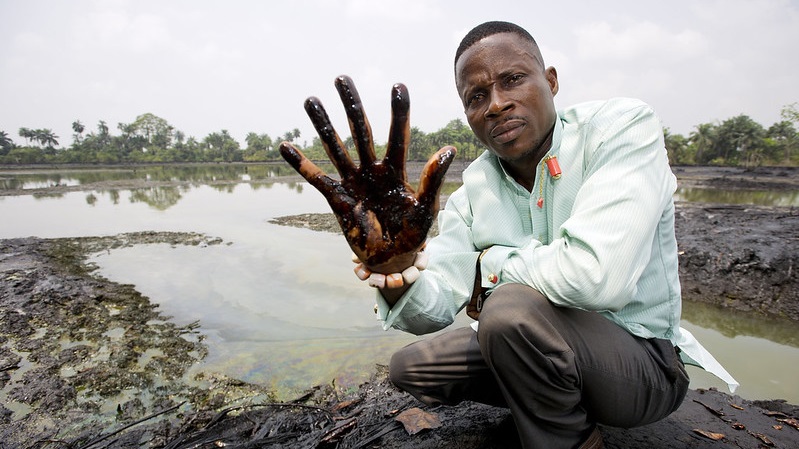Nigerian environmental activists are trying to stop Shell selling off its Nigerian onshore oil business without making amends for hundreds of oil spills.
Last month, Shell announced it had agreed to sell its land-based oil business to a consortium of five mainly Nigerian oil companies while keeping its offshore oil and its gas businesses in the country.
But the $1.3bn deal is dependent on the Nigerian government’s approval and will face legal challenges. Nigeria’s oil regulator stopped a similar sale by ExxonMobil in 2022.
Nigerian environmentalists and local residents want Shell to clean up land and water ruined by oil spills and to pay compensation before it sells of its assets.
“It would be unconscionable for Shell to pack up its onshore operations in Nigeria without cleaning up its mess and paying compensation” said some of the oil spill victims’ lawyer Steve Bilko.

Oil in the water in the Niger Delta in 2015 (Photos: Lilieudefensie)
Toxic history
The UK-Dutch company Shell has been drilling oil in Nigeria since the 1950s. In the southern Niger Delta region, many local residents have complained that their land is polluted while they are left out of the economic benefits.
This has led to sometimes violent conflict with Shell and the Nigerian government including the government’s hanging of local activist Ken Saro-Wiwa in 1995.
The National Oil Spill Detection Agency (Nosda) reports that Shell is responsible for hundreds of oil spills, mostly from pipelines around the city of Port Harcourt. These spills ruin farmland and kill the fish which many rely on for food and their livelihoods.

A map of oil leaks from Shell’s oil pipelines around Port Harcourt (Photos: Nosda)
The Nosda says over 95% of these spills to sabotage or theft of the oil. This is a big illegal business in the region. But Shell is legally responsible for the leaks, a headache which is pushing them to want to sell up.
In March 2022 though, Nigeria’s second-highest court issued an order preventing the company from selling any assets in Nigeria until a decision was reached on whether the company should pay over $2 billion in compensation for oil spills.
But last month, this court was overuled by Nigeria’s Supreme Court, who told them to look at it again. Soon after, Shell announced again that it was selling these assets.
Don’t let them sell
Bilko said many of his clients are “worried that the sale could affect [the Shell Petroleum Development Company’s] ability or willingness to fulfill the terms of any judgment which may be made against it, including in relation to orders to clean up and remediate the polluted areas”.
“We consider that Shell, having made billions of pounds over decades from extracting oil resources from Nigeria, should fulfill its legal responsibilities and not leave behind an environmental catastrophe as it seeks to exit the Niger Delta”, he added.
Bilko said he was also concerned that Shell “is leaving behind a vast network of crumbling infrastructure after decades of neglect and failures to properly maintain their pipelines and other assets”.
Chima Williams is the head of Nigerian campaign group Environmental Rights Action. He told Climate Home that citizens could take legal action against Shell to stop the sale “until there is a restoration of the spoilt environment to its original state”.
“Shameful”: Shell uses carbon credits under investigation to meet climate targets
Local groups like the Alliance for the Defence of Eleme have also opposed the sale and the leader of the Ijaw Nation leader ethnic group said he would explore legal options to halt the sale.
The consortium Shell is trying to sell its assets to is called Renaissance. It is made up of four Nigerian companies and a firm called Petrolin, co-founded by Gabon’s former oil minister Samuel Dossou-Aworet. The group’s CEO is former Shell employee Tony Attah.
The compensation could amount to nearly $2 billion. While Shell brought in revenues of $381 billion last year, the potential buyers are much smaller. Petrolin is headquartered in Switzerland, where revenue figures are not made public and Aradel Energy’s annual revenues are well under $1 billion.
Shell declined to comment but pointed Climate Home to a webpage which says that the new owners of Shell’s onshore oil business “will continue to be accountable” for that businesses share of any commitments to cleaning up oil spills.
It says the new owners have “significant combined experience” including in the Niger Delta, where four of the companies currently operate oil fields and that Shell is selling to “focus future investment in Nigeria on our Deepwater and Integrated Gas positions”.
